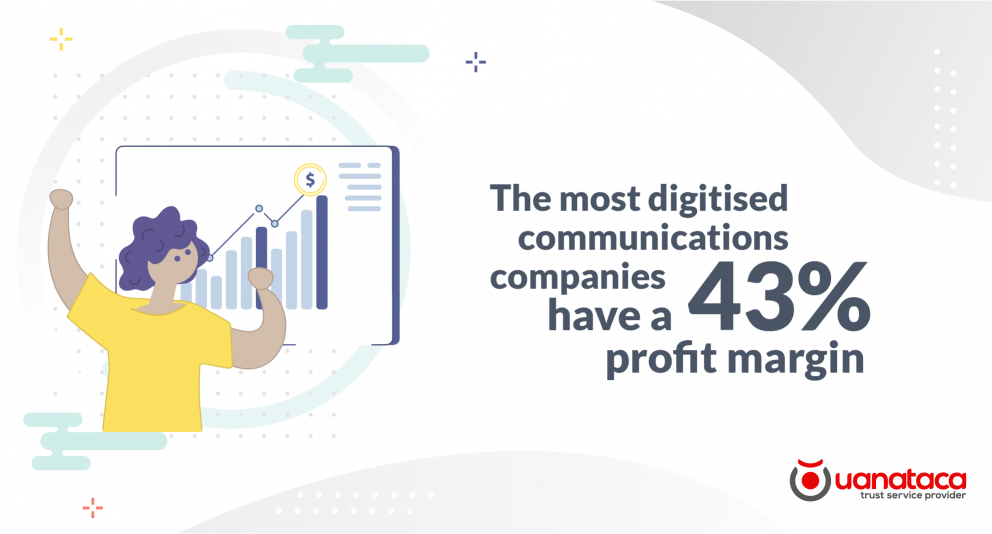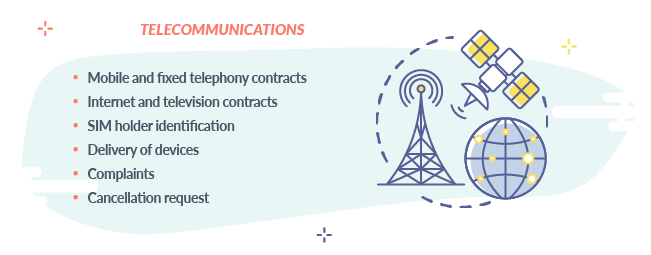
The telecommunications sector is critical. The COVID-19 pandemic has revealed that it is indispensable, yet the challenges facing the sector have put the financial health of a large part of the telecoms business at risk.
In the current context, digital transformation is the key to overcoming the challenges and driving the industry's growth. In this post we discuss the role of technology in the future of telecommunications and the advantages of using electronic signatures.
Main challenges for the telecoms industry
1.- SA 5G: the evolution of the fifth generation of mobile networks: the deployment of 5G technology is already underway and, according to forecasts, it could exceed one billion users before the end of this year. The evolution of this technology is unstoppable, with projects currently in the testing phase in most operators. This is the case of SA 5G networks (Stand-Alone or real 5G, without dependence on 4G), whose deployment is being delayed as development has been more complicated than expected.
Undoubtedly, the deployment of this new generation of networks poses a major challenge for the industry: the first is investment, with a very high cost for the construction of infrastructures; the second is amortisation, which takes years; and the third is price, with the need to find a balance between an attractive price for the user, but at the same time one that is profitable for operators.
2.- Security: guaranteeing user security is one of the great challenges associated with 5G. The fact that there are many more connected devices increases the opportunities for attacks. In addition, the practical application of 5G to services such as telemedicine increases the need to strengthen security to achieve a secure and reliable system.
3.- Regulation: The telecommunications industry is a highly regulated sector, in order to protect citizens' rights and promote the correct functioning of the market. Different institutions such as the United Nations and the European Commission actively promote the updating of regulations to create a regulatory framework that guarantees an inclusive and sustainable digital transformation.
4.- Competency: according to an analysis by BDO, the internationally recognised business consultancy, 76% of large multinationals in the telecommunications industry consider that one of their greatest challenges is to increase Competency.
In recent years, mobile virtual network operators (MVNOs) have made a strong entry into the market, causing tariffs to fall dramatically. This downward price war directly affects the revenues of large companies and poses a major investment risk.
5.- Digitalisation: in such a competitive environment and with a policy of falling prices, digitalisation becomes a key factor in maximising profitability and guaranteeing business continuity. Undoubtedly, reaching digital maturity is a great challenge that, as we will see in the following section, also brings great benefits.
Digital transformation: the key to financial health
According to a recent McKinsey study analysing the performance of 80 telecommunications companies with different levels of digitisation, only companies with strong digital capabilities have a profit margin of 43%. In particular, five IT areas are key to achieving good financial health and ensuring business continuity: customer analytics, digitisation of order management, customer relationship management, simplified IT applications environment and automation of IT infrastructure management.
Despite the importance of digitisation in the industry, only 1 in 4 international companies have successfully completed the digital transformation. However, they all share four key areas as strategic priorities: digital customer engagement, smart network applications, digital operations and support functions, and next-generation sales and marketing.
What is the role of e-signatures in the future of telcos?
Given that most telecommunications companies fail in digitisation and that this process is essential for business profitability, companies in the sector must continue to drive the adoption of technologies, especially in specific and strategic areas. In this sense, the electronic signature is a transversal tool in all business areas.
In the sales and commercial area, electronic signatures have made it easier than ever for customers to interact with companies. Although the customer profile tends to be very diverse, the speed, simplicity and accessibility of electronic signatures are highly valued and decisive aspects when contracting a service.

In the new telecommunications horizon, customer experience and satisfaction are two priority factors for companies. Both elements influence the definition of the different digital strategies that will mark the success of the business. At a strategic level, the electronic signature ensures the best customer experience in every situation, in addition, it increases the competitive capacity and strengthens the company's leadership in the market.

⭐️⭐️⭐️⭐️⭐️ Our recommendation for Telcos >> One-Shot Signature: now with Video Identification
The One-Shot Signature with Video Identification is the qualified single-use signature solution that enables remote identification.
A solution designed to sign documents with a digital certificate without the need for your customers to already have one. Ease and immediacy to offer the best digital experience. Request your free, personalised demo here.
In conclusion, the evolution of the telecommunications sector is essential for the development of society as a whole: its progress drives our own. Therefore, the digitisation of the industry is key to the proper functioning of society in all its aspects, both economic and personal.